Description
Muslim Students, Education and Neoliberalism, 1st ed. 2017
Schooling a 'Suspect Community'
Coordinators: Mac an Ghaill Máirtín, Haywood Chris
Language: English
Subjects for Muslim Students, Education and Neoliberalism:
Keywords
community; education; neoliberalism; political science; political theory; politics; schooling; islam
Publication date: 03-2017
Support: Print on demand
Support: Print on demand
Description
/li>Contents
/li>Biography
/li>Comment
/li>
This edited collection brings together international leading scholars to explore why the education of Muslim students is globally associated with radicalisation, extremism and securitisation. The chapters address a wide range of topics, including neoliberal education policy and globalization; faith-based communities and Islamophobia; social mobility and inequality; securitisation and counter terrorism; and shifting youth representations. Educational sectors from a wide range of national settings are discussed, including the US, China, Turkey, Canada, Germany and the UK; this international focus enables comparative insights into emerging identities and subjectivities among young Muslim men and women across different educational institutions, and introduces the reader to the global diversity of a new generation of Muslim students who are creatively engaging with a rapidly changing twenty-first century education system. The book will appeal to those with an interest in race/ethnicity, Islamophobia, faith and multiculturalism, identity, and broader questions of education and social and global change.
Introduction.- Chapter 1. Dangerous Radicals or Symbols of Crisis and Change: Re-Theorising the Status of Muslim Boys as a Threat to the Social Order; Farzana Shain.- Chapter 2. Late Modern Muslims: Theorising Islamic Identities amongst University Students; Paul Bagguley & Yasmin Hussain; Chapter 3. Education of Muslim Students in Turbulent Times; Saeeda Shah.- Chapter 4. Factoring in Faith Fairly: A Contribution from Critical Realism to the Authentic Framing of Muslims-in-Education; Matthew Wilkinson.- Chapter 5. Towards Multicultural, Multi-Religious European Societies? Schooling Turkish Students in Britain and Germany; Daniel Faas.- Chapter 6. "Uncivil" Activism: Arab, South Asian, and Afghan American Youth Politics after 9/11; Sunaina Maria.- Chapter 7. Schooling the Enemy Within: Politics and Pedagogy; Khawlah Ahmed.- Chapter 8. The Prevent Policy and the Values Discourse: Muslims and Racial Governmentality; Shamim Miah.- Chapter 9. Islamophobia in Quebec Secondary Schools: Inquiries into the Experiences of Muslim Male Youth Post-9/11; Naved Bakali.- Chapter 10. At the Intersection of Neoliberalism and Islam: Being a Muslim Woman in Turkish Universities; Pinar Enneli & Çağlar Enneli.- Chapter 11. Being Uyghur or Being Muslim? Identity Construction of Tertiary-Level Uyghur Students in China; Mingyue Gu & Xiaoyan Guo.- Chapter 12. Educating Muslim Students: Late Modernity, Masculinity, Inclusion/Exclusion and the Neoliberal School; Mairtin Mac an Ghaill & Chris Haywood.- Chapter 13. Muslim Narratives of Schooling in Britain: From "Paki" to the "Would-be-Terrorist"; Tania Saeed.
Máirtín Mac an Ghaill is Professor of Education at Newman University, UK. He is the author of The Making of Men: Masculinities, Sexuality and Schooling. He has published several books and articles with Chris Haywood, including Men and Masculinities and Education and Masculinities: Social, Cultural and Global Transformations. He is currently researching Muslim men and masculinities.
Chris Haywood is Senior Lecturer in Media and Cultural Studies at Newcastle University, UK. His main interest is men and masculinities, and he is currently exploring the emergence of new sexual cultures with a particular focus on anonymous sex with strangers. This is part of a broader study on men’s dating practices with a particular focus on mobile dating, online dating and speed dating. Overall, he is interested in pushing the conceptual limits of masculinity models to consider ways of gendering that are not reducible to masculinity or femininity.
Examines why the education of Muslim students is associated with extremism
Critically examines the damaging effects of neoliberal education policies in higher education
Brings together leading scholars from a wide range of countries to offer a global perspective
© 2024 LAVOISIER S.A.S.




